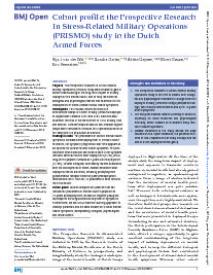Cohort profile: the Prospective Research In Stress-Related Military Operations (PRISMO) study in the Dutch Armed Forces
Purpose: The Prospective Research in Stress-Related Military Operations (PRISMO) study was initiated to gain a better understanding of the long-term impact of military deployment on mental health, and to map the different biological and psychological factors that contribute to the development of stress-related mental health symptoms.
Participants: The PRISMO cohort consists of a convenience sample of Dutch military personnel deployed to Afghanistan between 2005 and 2008. Baseline data collection resulted in the recruitment of 1032 military men and women. Combat troops as well as non-combat support troops were recruited to increase the representativeness of the sample to the population as a whole.
Findings to date: The prevalence of various mental health symptoms increases after deployment in PRISMO cohort members, but symptom progression over time appears to be specific for various mental health symptoms. For posttraumatic stress disorder, we found a short-term symptom increase within 6 months after deployment (8.2%), and a long-term symptom increase at 5 years after deployment (12.9%). Several biological vulnerability factors associated with the development of stress-related conditions after deployment were identified, including predeployment glucocorticoid receptor sensitivity and predeployment testosterone level. Thus far, 34 publications have resulted from the cohort.
Future plans: Various analyses are planned that will include the prevalence of mental health symptoms at 10 years postdeployment, as well as trajectory analyses that capture the longitudinal development of symptoms. Furthermore, we will use a machine learning approach to develop predictive and network models for several mental health symptoms, incorporating biological, psychological and social factors.
Geachte bezoeker,
De informatie die u nu opvraagt, kan door psychotraumanet niet aan u worden getoond. Dit kan verschillende redenen hebben,
waarvan (bescherming van het) auteursrecht de meeste voorkomende is. Wanneer het mogelijk is om u door te verwijzen naar de bron
van deze informatie, dan ziet u hier onder een link naar die plek.
Als er geen link staat, kunt u contact opnemen met de bibliotheek,
die u verder op weg kan helpen.
Met vriendelijke groet,
Het psychotraumanet-team.
In: BMJ Open ; ISSN : 2044-6055 | 9 | e026670
https://bmjopen.bmj.com/content/bmjopen/9/3/e026670.full.pdf


